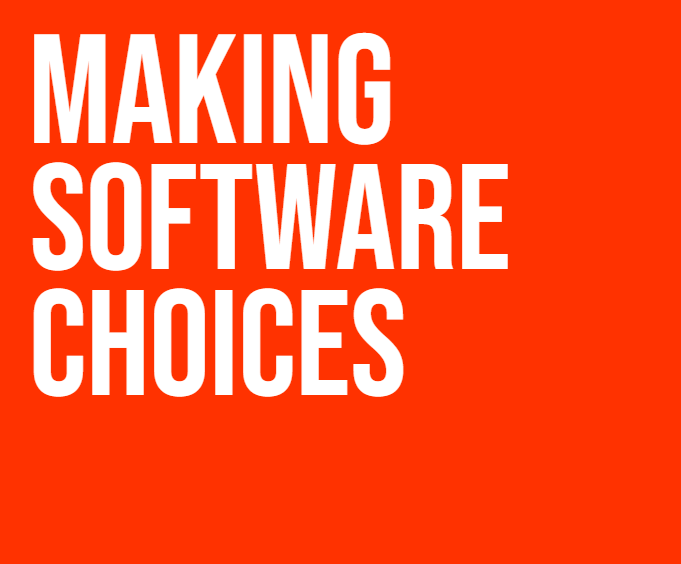What is a CRM system?
A customer relationship management system — CRM for short — is a piece of software that allows a company to keep a detailed record of all contact with its customers and potential customers.
That contact might take the form of an email, a telephone call or a meeting, for example.
Many companies use their CRM software as a sales tool - a way for their sales teams to keep track of sales conversations and monitor which potential customers might become paying customers.
Some companies are focused more on using their CRM to manage how they work with existing customers, using their software to track and handle customer service issues.
CRM software can also be used for both of these purposes - driving sales and then looking after customers once they're on board.
Sales-focused CRM
First, let's look at how a sales team might use CRM software, using an example where the company is selling to other businesses.
The CRM system might be used to store the following information:
- What is the name of the company - and what does it do?
- Who are the important contacts at that company?
- What engagement have you had with those different contacts, if at all? What was said?
- What are the contact's or customers pain points? What are they focused on?
- What have you sold to the company in the past, if anything?
- Is there a specific opportunity to sell something to the company in the near-term?
A company might typically be added to the system before it has become a customer. Somebody at that company might express an interest in your products or services and be added at that point. Maybe they made contact at a trade show or got in touch after seeing an advert. Or maybe they got your contact details from somebody they know already.
Alternatively, a sales person might identify that company as a potential customer, add it to the system themselves and then make contact to build a relationship and pursue a sale.
A marketing team might also add names to the system for sales teams to pursue.
Performance improvement
CRM software allows sales teams to operate more efficiently and provide sales managers with an overview of their team's activity and successes. How many new contacts have the team spoken to this week? How many phone calls have they made? How many potential sales are the team working on? The software gives a real-time view of activity and allows the company to more easily track and improve sales team performance.
Sales teams also can be fully-informed about recent contact when they prepare for a sales conversation with a client or potential client.
There's also a very practical reason to embrace CRM software - information is stored in a single place and accessible by anybody. If somebody's away from the office and a contact calls up to make a purchase, anybody in the team can go into their record and get an accurate view of contact to date.
Pipeline tracking
We haven't talked yet about one of the most valuable features of a CRM system - the ability to value your pipeline. If a sales person is talking to a potential customer about buying a specific product or service, they record in the system the value of that transaction. Good CRM software will then mark that transaction with a likelihood of success. If it's early days, you might say there's a 10% likelihood of the transaction concluding. As the sale progresses, that might increase to 25%, 50%, 75% or more. And when the sale closes, it's 100%.
A £10,000 transaction with a 10% likelihood of success is worth £1,000 in the pipeline (i.e. 10% of £10,000). You'd need ten of those possible transactions to have confidence of bringing in £10,000 in contract value.
We've talked here about the example of a company that sells to businesses - i.e. B2B sales - but CRM software is equally valuable for businesses that sell to consumers. If you've ever registered with an estate agent, bought a car through a motor dealer or had your car serviced through a big brand, you've probably had your details captured on CRM software.
CRM for marketers
CRM systems are also valuable for marketers, who can use a CRM system to better understand specific customers. Marketers can also integrate CRM systems with marketing tools, such as email marketing platforms, to capture in the CRM information on how contacts engage with marketing activity (e.g. company newsletters). For example, if you send a contact a marketing email and they open it, this can be recorded in the CRM system, helping both sales and marketing teams understand that the contact is engaging with the company's materials.
There are lots of different CRM platforms available, ranging hugely in price, capability and complexity. At the more sophisticated end of the market, tools like Salesforce are incredibly powerful and flexible, but can be expensive to implement, with companies often creating specific roles to support the smooth running of the system or contracting with support firms to provide the team with ongoing technical support.
Tools like Pipedrive and Hubspot are less complex and less expensive. While they might not offer the flexibility of more sophisticated tools, they are easy to implement and less expensive.
The great thing about investing in a CRM system now is the choice available to you. There are a range of good options, complemented by easy integrations with other software, which will allow you to invest in more technology to help the smooth-running of your business.
